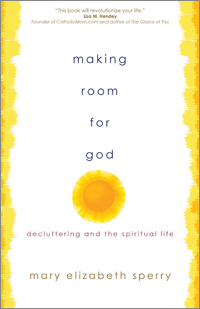 “Making Room for God: Decluttering and the Spiritual Life”
“Making Room for God: Decluttering and the Spiritual Life”
by Mary Elizabeth Sperry.
Ave Maria Press (Notre Dame, Indiana, 2018).
112 pp., $14.95.
Organizing and decluttering are big business these days. Thanks in part to mass consumption of largely unnecessary material goods, many find themselves in a state of too much stuff.
Marketers have tapped into this issue, addressing the desire some feel to declutter into a clever avenue to get people to buy more stuff to help organize the clutter. Entire stores and television shows are devoted to this industry. It’s a brilliant cycle for retailers, yet sinful and challenging for consumers.
[hotblock]
Author Mary Elizabeth Sperry has also tapped into this issue but in a unique, refreshing, positive and pragmatic way. Unlike the savvy advertisers, Sperry does not entice the reader to buy more. And unlike the secular self-help resources already available, Sperry does not repeat recommendations for purging and organizing already promoted on the aforementioned television shows.
Instead, she uses the teachings of the church, prayer and spiritual direction as a guide and driving force for decluttering. Truly throughout the process — from identifying its sinful start to proactively dealing with the problem to its necessary conclusion — Sperry offers ways for people to declutter and to make room for God.
The author of five books, Sperry has worked for the U.S. Conference of Catholic Bishops since 1994. She is associate director for USCCB permissions and NAB (New American Bible) utilization. She has been interviewed on a variety of spiritual topics by National Public Radio, EWTN Radio, CBS Radio, Relevant Radio and SiriusXM.
Sperry is frank. Calling herself a “pack rat,” she admits her propensity toward overaccumulation, inability to keep on top of the piles and fear of throwing things out. She describes her house and schedule in detail, painting a scene probably all too familiar to the over-booked and overwhelmed reader.
Sperry is also funny. Making her book a quick read, she intertwines doctrinal teachings rooted in the Bible and the catechism with silly analogies. Take for example the sloth story.
“The last thing I want to do on a gorgeous Saturday is to sit in my bedroom sorting shoes,” she wrote. “It’s just so much easier to tell myself that I’ll get around to it someday. That’s the sloth talking. If I’m honest, there’s time. I’d just rather spend it watching videos of baby sloths.”
Each chapter follows the same general format. The chapters are organized into Sperry’s personal decluttering efforts using faith as her guide with related church teachings, then pragmatic steps for change for the reader, followed by reflection questions.
[tower]
“Making Room for God” starts by addressing the root of the problem: Sinful behaviors that can lead to accumulation of clutter. A fear that God will not provide (hurry up and buy stuff in case you might need it later!) and building a wall of separation with stuff that makes a relationship with God difficult (too much stuff can also act a barrier to relationships with others) are main offenses.
If this hits a little too close to home, that’s OK. There is help. The chapter ends with this reflection and recommendation: “What near occasions of sin do I need to avoid so that I can deal with my clutter? … Notice how sale ads trigger the urge to make a purchase immediately. Then try a media fast for one day, using the time to look at the objects you already own with new eyes.”
The book also addresses clutter and the common good. Pulling from the Compendium of the Social Doctrine of the Church, the book stresses that “no one has a right to have more than he or she can use.” It’s unjust, unethical and, of course leads to too much clutter. Overconsumption also damages the environment. It is time to purge properly, donate with a purpose and be aware of the social impact of purchases.
Sperry admits she still does not have a perfectly decluttered home and she bemoans the frustration that decluttering and the spiritual life are both never done. Just as a house continues to get messy, following Jesus is a daily, never-ending journey. A true authentic Christian life requires spiritual discipline — and a routinely decluttered life requires the same.
This book is most certainly for the reader needing help. And, as mentioned, Sperry offers hope and practical help. And for those neat freaks out there, they too can glean fruitful insights into the church’s teachings on sin and consumerism, penance and spirituality. Perhaps their sin isn’t clutter, but whatever sin it is, God can help with his church’s teachings.
***
Lordan has master’s degrees in education and political science and is a former assistant international editor of Catholic News Service. She is a digital editor at Peanut Butter & Grace, an online resource for Catholic family catechesis.
PREVIOUS: Catholic art teacher looks to God for calmness at Miss America pageant
NEXT: Lego movies offer what serious most superhero films don’t: Fun



Share this story